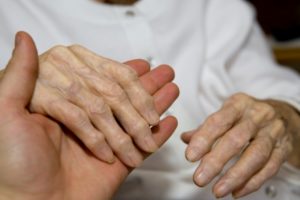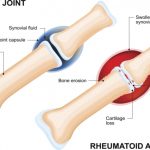
Below we share useful information on rheumatoid arthritis, including causes, symptoms, and treatment along with key differences between rheumatoid arthritis and other conditions.
Rheumatoid arthritis and depression linked: Depression may worsen the arthritis pain
Depression has been found to worsen pain experienced in rheumatoid arthritis. Rates of depression among rheumatoid arthritis patients is estimated between 13 to 42 percent which reveals how closely associated the two conditions really are. As to why depression is so prevalent in arthritis is that dealing with a chronic condition is stressful which can take a toll on someone’s mental health.
Depression can stem from the acknowledgement that a person with arthritis is unable to perform common functions which they did before or form living in pain. Furthermore patients may feel anxious that they now need to rely on others for support along with worrying about changes that are occurring with their bodies. Continue reading…


Recent research suggests that people who suffer from inflammatory joint disease, such as rheumatoid arthritis, are at a higher risk for cardiovascular disease that could be better controlled if only preventative measures were adopted.
Although there is no definitive proof that inflammation causes cardiovascular disease, research tells us that inflammation is common in people who suffer strokes and heart disease. It is, therefore, very important to understand inflammation and what it can do to the body, including the heart. The new research indicates that people who live with inflammatory joint disease like rheumatoid arthritis or spondyloarthritis are at an increased risk for cardiovascular disease (CVD) because too few are prescribed preventative therapies. Continue reading…
Rheumatoid arthritis is an autoimmune disease, meaning, the body’s own immune system attacks itself, mistaking parts of the body for a virus. In the case of rheumatoid arthritis, the immune system attacks the synovium, the soft tissue lining the surface of the joints, which results in symptoms like pain and swelling.
Rheumatoid arthritis increases one’s risk for a number of other conditions, including osteoporosis, rheumatoid nodules, dry eyes and dry mouth, infections, abnormal body composition, carpal tunnel syndrome, heart problems, lung problems, and lymphoma. If rheumatoid arthritis is not well managed, the risk of these complications rises dramatically. Continue reading…
Rheumatoid arthritis (RA) and lupus are two conditions that cause joint pain. Although joint pain as a common symptom, they are two separate conditions requiring different treatments.
Arthritis is a chronic inflammatory condition affecting the joints, and there are many different types of arthritis. Rheumatoid arthritis is an autoimmune disorder in which the immune system acts wrongly and begins to attack itself – in the case of RA, it’s the joints that are under attack. Continue reading…
Rheumatoid arthritis and psoriatic arthritis are different forms of arthritis, where the former is an autoimmune disease, while the latter stems from psoriasis, which is a skin condition. Nearly 30 percent of psoriasis patients will develop psoriatic arthritis, and rheumatoid arthritis affects 1.3 million people in the U.S.
The two conditions share some of the symptoms, and that is why it is essential that your doctor conducts the proper testing to avoid misdiagnosis. The good news is, many of the treatments for psoriatic arthritis and rheumatoid arthritis are the same. Continue reading…